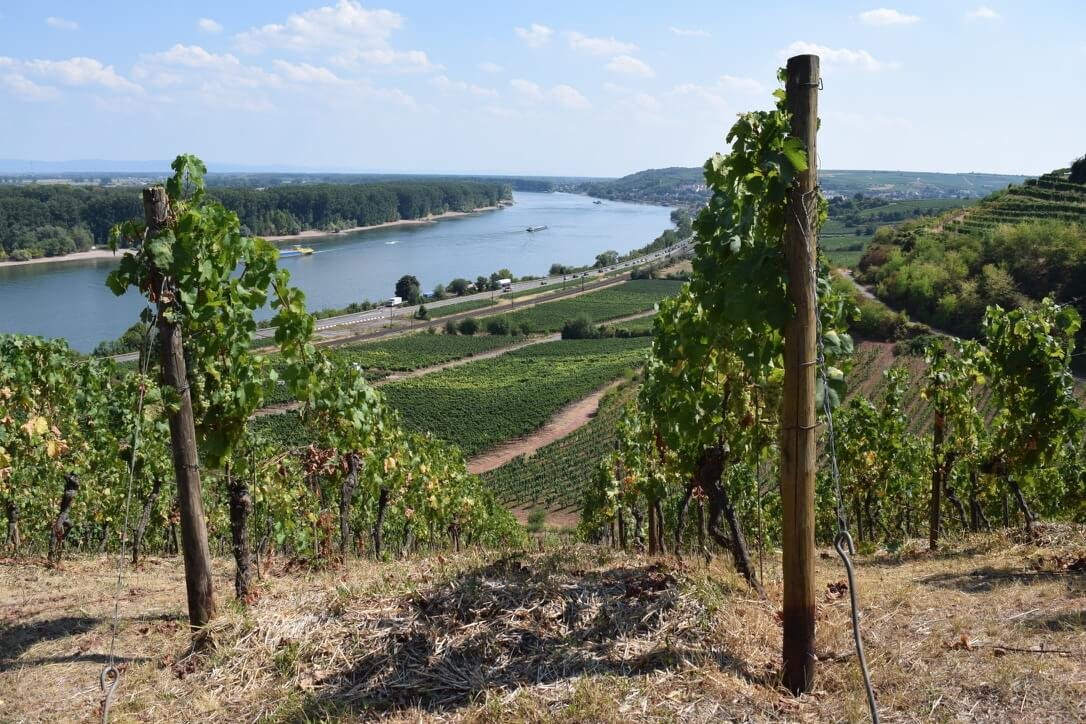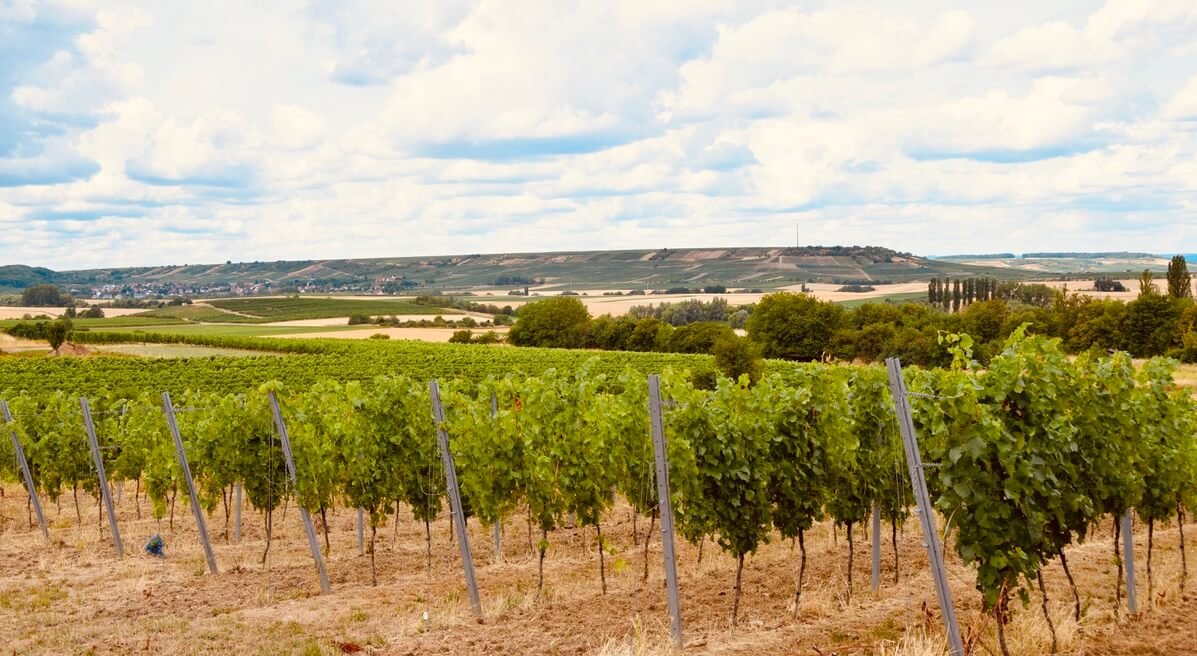RHEINHESSEN WINE REGION - GERMANY

View to River Rhine from the Roter Hang vineyards, Rheinhessen
Source: Winekeller
Winekeller wine travel and wine tour experiences in the Rheinhessen wine region:
Recommended tours in Rheinhessen:
Tour: ‘The hills, wines, history & culture of Rheinhessen’ guided tour - (by mini-bus)
Tour operator: BottleStops
Duration: 1 day
Departing from: Mainz
Rheinhessen Germany: an introduction
Rheinhessen is the largest wine region in Germany and and in recent years, most progressive wine region, with about 27,000 hectares of vineyards.
Much progress has been made here over the last 20 years, with Rheinhessen transitioning its reputation away from a large-scale producer of cheaper blends marketed under names such as ‘Liebfraumilch’ and ‘Niersteiner Gutes Domtal’ (based on sweetened Müller-Thurgau wines) to a producer of a large variety of excellent wines and home to an increasing number of younger, ambitious, quality-focused winemakers.
Much of the region, located on the left bank of the River Rhine, across from the Rheingau wine region, is beautiful rolling farmland, interspersed with lovely wine villages and vineyards. Key cities include Mainz in the north-east of the region, proclaimed as the ‘wine capital of Germany’. To the west of Mainz and lying at the extreme north of the Rheinhessen wine region is Bingen, the popular wine town, across the Rhine from Rüdesheim. In the south of Rheinhessen lies the historic city of Worms.
Rheinhessen and Mainz - Great Wine Capital
Since 2008 Mainz, the state-capital of Rheinland-Pfalz and Rheinhessen have been members of the Great Wine Capitals Global Network representing the world’s best wine regions.

Rheinhessen vineyards
Source: Winekeller
Rheinhessen vineyards
Rheinhessen wine map
The Rheinhessen climate is mild and the region is protected from winds and excessive rain by hills in the west.
Temperatures in the vineyards closest to the river Rhine are warmer throughout the year and they also avoid severe winter frosts.
There are 3 distinct Rheinhessen vineyard areas - the northern region around Bingen and Ingelheim, the ‘Rheinterrasse’ in the eastern area (including the famous ‘Roter Hang’) and the south-west region called Wonnegau.
In total there are approximately 150 wine-growing villages in Rheinhessen and over 400 named single-vineyard sites.
Northern Rheinhessen:
In the north of Rheinhessen, the best vineyard sites are around Bingen on the Rhine, where steep slopes and quartzite slate soils produce some excellent Rieslings. Also in the northern region, some excellent wines are produced around the town of Ingelheim, which is traditionally known for its Pinot noir - or Spätburgunder - wines.
The ‘Rheinterrasse’:
Some truly excellent wines are produced along the ‘Rheinterrasse’, an area south of Mainz, most associated with Rheinhessen’s reputation for quality wines, between and around the popular wine towns of Nackenheim and Nierstein.
There is a specific area called ‘Roter Hang’ or ‘red slope’, between Nierstein and Hakenheim, where some of the region’s most famous vineyards are located (including Hipping, Oelberg, Orbel, and Pettental.) The Rotliegenden - Permian red soils - retain the sun’s heat, especially on the steeper, south-facing vineyard slopes, helping to produce some truly exceptional wines.
South-west Rhienhessen - Wonnegau:
The south-west of Rheinhessen - the so-called ‘Wonnegau’ has attracted international attention since the 1990s for the spectacular quality of its wines, in particular its Rieslings, but increasingly its Pinot noirs and Silvaner wines. Some of the Wonnegau villages and their vineyards are now recognised around the world - for example ‘Hubacker’ in Flörsheim-Dalsheim, ‘Geiersberg’ in Dittelsheim and ‘Morstein’ in Westhofen and are home to a concentration of young, gifted winemakers who have helped put top quality Rheinhessen wines on the global wine stage (see below - ‘Rheinhessen winemakers’).
With Weingut Riffel in Bingen
Weingut Beck in Stadecken
The 'Roter Hang'
The famous 'Hubacker' vineyard
Rheinhessen wine
Wine has been grown in Rheinhessen since Roman times. The varied soils and favourable climate here make it possible to grow many different grape varieties and it’s this, as well as in more recent years, the exceptional quality of the wines, for which Rheinhessen is known.
75% of wines prodution is white wine but Rheinhessen is also known for its excellent reds, based on Dornfelder grapes and increasingly Pinot noir, or Spätburgunder grapes. 20 years ago the predominant grape variety was Müller Thurgau, the basis of mainly blended and sweeter wines.
Rheinhessen Riesling
Today however, it's the region’s quality, dry wines which have the momentum, with Riesling being the most planted variety. Pinot gris and Pinot blanc are also increasingly popular, along with the classic grape varieties, Scheurebe and Silvaner.
Rheinhessen is also home to a strong sparkling wine - or ‘sekt’ - culture and Germany’s most respected producer of sparkling wine, Sekthaus Raumland is in the southern village of Flörsheim-Dahlsheim.
Rheinhessen’s famous winemakers
The rise of the new generation of quality-focused wine producers, particularly in the southern villages in the Wonnegau district has been truly remarkable. This has been led in particular by 2 winemakers, Klaus Peter Keller and Philip Wittman, who transformed their family estates in the villages of Flörsheim-Dahlsheim and Westhofen respectively, but many other have followed their lead, including - but not limited to: Stefan Winter in Dittelsheim, Daniel Wagner-Stempel in Siefersheim and Oliver Spanier in Hohen-Sülzen.
Klaus Peter Keller and a group of sommeliers (2008 Winekeller)
Stefan Winter, Dittelsheim
Recommended Rheinhessen wineries
Here are some Rheinhessen wineries we can personally recommend, having visited the vineyards and tasted the wines:
Weingut Riffel, Bingen
Weingut Lorenz, Friesenheim-Nierstein
Weingut Neus, Ingelheim
Weingut Winter, Dittelsheim
Weingut St. Anthony, Nierstein
Weingut Braunewell, Essenheim
Weingut Keller, Flörsheim-Dalsheim
Weingut Beck- Hedersheimerhof, Stadecken-Elsheim
Weingut Thörle, Saulheim
Weingut Wittmann, Westhofen
Rheinhessen travel guide and useful information
Getting to Rheinhessen
Frankfurt International Airport - ‘RheinMain’ is about a 20 minutes drive from Mainz, which is also very well connected through the German rail network.
Rheinhessen hiking and cycling trails
Rheinhessen is known as the ‘land of 1000 hills’ and what better ways to discover this beautiful region and enjoy its wines and wine culture than to take to the many hiking and cycling trails?
There are 290 kms of signposted hiking trails waiting to be explored and the ‘RheinTerrassenWeg’ takes you leisurely from wine village to wine village. See here for information and ideas about hiking in Rheinhessen!
There are also over 500 kms of cycle paths and 90 kms of Rhine cycle paths - see here for more information.
Cycling through Rheinhessen - Source: Winekeller
The Rhine cycle path - Source: Winekeller
Rheinhessen cities
As a contrast to exploring the beautiful Rheinhessen landscapes, there’s lots to discover in its cities too!
The city of Mainz, at the heart of Germany’s largest wine region is recognised as the German wine capital - and it’s not hard to see why! Mainz, located at the confluence of the Rhine and Main rivers, is a lively city, also one of Germany’s ‘carnival capitals’ and has a wonderful historic centre, with its half-timbered houses, cobbled streets, cosy wine taverns, cafes, shops and boutiques.
The heart of the city is the spectacular Mainz Dom - the 1000 year old cathedral featuring Romanesque, Gothic and Baroque styles and made of distinctive red sandstone.
The city of Worms is proud of its 2000 years history and its connection with Germany's famous Nibelungen legend, Martin Luther and Jewish history. Worms was for centuries one of the great Rhineland cities and is dominated today by the impressive St. Peters Cathedral.
Mainz Dom
Rheinhessen events and festivals
There are always events and festivals taking place in Rheinhessen, including wine festivals, drama, music - see here for some ideas! The wine festivals are always great fun and a superb way to experience regional culture, traditions, food and of course wines!
The cathedral in Worms
Traditional Rheinhessen food
The gastronomy in Rheinhessen is as varied as the region itself - but it can be wonderfully described as hearty, wholesome and uncomplicated! Rheinhessen is a major producer of fruit and vegetables so these feature strongly in the regional gastronomy.
‘Weck, Worscht and Woi’ describes (in local dialect!), the simple snack of ‘bread, sausage and wine’, but eaten in the middle of the vineyards and the rolling fields, in the warm sunshine, can life get any better??
A popular, traditional food In Rheinhessen is “Spundekäs”, a cream cheese with peppers, onions and spices, which you will often be offered at wine tastings. Enjoying local food and wine in vineyard is one of life’s pleasures and we have certainly enjoyed the hospitality of Weingut Beck - Hedesheimer Hof as described in this article and can highly recommend!
A typical Rheinhessen regional salad
Typical cold plate: source Rheinhessen.de
Picnic in the vineyards with Weingut Beck
Planning your Rheinhessen wine tour:
Hopefully our suggestions have given you some insights for planning a wine tour of Germany’s Rheinhessen wine region. You may look to combine a Rheinhessen wine tour with a Rheingau wine tour - especially the northern part of Rheinhessen as they are within very easy reach of one another.
For further insights and inspiration see: Rheinhessen







See what we discovered exploring Germany’s north-east Rheinhessen wine region in 3 days by e-bike - including the vineyards around Ingelheim in the north and the Seltz valley and along the banks of the Rhine in the east, the Rheinterrasse…..